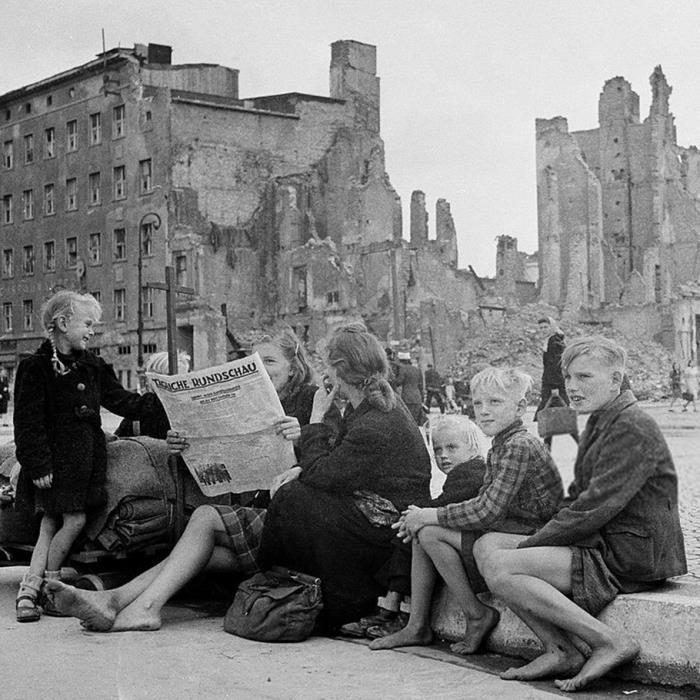
World War II Expullsion of Germans from Eastern Europe: Soviet Occupation Zone

Figure 1.--Over 12 million Germans were expelled from Eastern Europe after World War II. Many Germans departed as the wehrmacht retreated. The rest were forcibly expelled after the War. Most entered the Soviet occupation zone. Soviet authorities wanted no part of them and deported them on to the British and American occupation zones. The French also refused to accept them. Another group of Germans were set in motion -- the Germans caught in the Soviet occupation zone. Here a family after fleeing the Soviet occupation zone rests after reaching West Berlin (April 1946). It is likely that their father was a soldier killed in the War or in a POW camp. Soon the Soviets and East German Communists would begin making this increasinly difficult.
|
|
We do not yet have a full picture as to just what occured in the Soviet occupation zone in reference to the expullsion of the Germans. And at the end of the War there were already large numbers of evacues from the east in the Soviet occupation zone. And it is a complicated issue because of Soviet policy and the subsequent policies of East Germany which developed from the Soviet occupation zone. The Soviet zone was of course what was left of eastern Germany. Thus it was the part of Germany clost to Poland, the Baltic republics (annexed by the Soviets), and the former German territories annexed by Poland and the Soviet Union. Thus it was the area where many of the evacuees/deportees first arrived. A tragedy of the war was the large number of evacuees from the East in Dresden at the time the city was bombed. And some deportes from Czecholslovakia also enteed the Soviet occuption zone. Many evacuees/deportes were in a terrible strait. And while the NAZI Government made some effort to help, Soviet authorities after the War did not. It was in fact the Soviets who had promted and in part actually carried out the expulsions. And they offered little support for the humanitarian effort to assist seeing the highest priority dealing with the massive humanitarian nightmare that the NAZIs leff in their wake in western Russia and the Ukraine. The Soviet attitude was it was up to the Western Allies who had suffered less to absorb the Germans expelled from the East in their zones of occupation. The Soviets were more focused on punishing than aiding the Germans. The Soviets failed to comply with their Potsdam commitments, especially supplying food (eastern Germany was a lagely agricultural area) and thus the United States soon stopped complying with its commiments on reparations. And even in the Western zones there was not total agreement. The French who were not at Potsdam and thisnot a sinatory refused to comply with the decesions on evacuees. And they refused to accept and aid them. In fact, Soviet authorities deported most of them on to the american and Britih occuption zones. Thus the responsibility fell primarily on the Americans and British. Most of the deportees and even some of the residents in the Soviet zone wanted to reach the Western zones. As the deportees had no local roots, depite their condition, they were the most mobile. Only later as Stalin began to see the value of a Communist German state in the developing Cold War did Soviet policy toward holding Germans in their zone began to materialize--a sharp change in policy. And here Berlin began to play an important role. It was the easiet way of reaching the west. Once in the wetern zone of Berlin, lthough surrouned by the Soviet zone, thy could reach the Western occupation zone in safety. This would emerge as a major Cold War issue.
CIH -- WW II

Navigate the HBC German sectiom:
[Return to the Main German expullsion page]
[Return to the Main post World War II expullsion of Germans page]
[German choirs]
[German movies]
[German school uniforms]
[German royalty]
[German youth groups]
[German sailor suits]
[Lederhosen]
[Ethnic]
[Tights]
[Long stockings]
Navigate the CIH World War II section:
[About Us]
[Aftermath]
[Biographies]
[Campaigns]
[Children]
[Countries]
[Deciding factors]
[Diplomacy]
[Geo-political crisis]
[Economics]
[Home front]
[Intelligence]
[POWs]
[Resistance]
[Race]
[Refugees]
[Technology]
[Totalitarian powers]
[Bibliographies]
[Contributions]
[FAQs]
[Images]
[Links]
[Registration]
[Tools]
[Return to Main World War II page]
[Return to Main war essay page]
[Return to CIH Home page]
Created: 7:04 AM 2/13/2016
Last updated: 7:04 AM 2/13/2016



